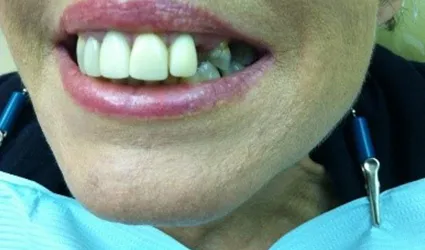Individuals often experience tooth loss problems due to tooth decay, gum disease or trauma. In a latest survey done in “National institute of dental and craniofacial research”, in person from age group of 20-49 years, the average tooth loss is 3. Whereas that in age group of 50-64 years is 8 missing teeth on an average. Older adults, Smokers, Diabetics have more chances complete loss of teeth.
If one or more of your teeth is missing, it can affect your future oral health. Dentists at Exldentist, Gurgaon, will tell you that replacing a missing tooth or teeth is very important for the following reasons:
- 1. Improving Aesthetics
When the missing tooth is in the front region, we lose our confidence in our smile. The missing teeth at back region for a long period of time causes muscle atrophy on that side and thus a slight facial asymmetry. Thus the importance of replacing missing teeth, as this can have a serious impact on our personal and professional lives, as we may avoid smiling in public altogether.
- 2. FUNCTIONAL PROBLEMS: Chewing and speaking problems
Apart from aesthetics, the other functions of your teeth are to bite and chew which involves the cutting, mixing, and grinding food, as well as to help you speak. However, for these functions to work properly, the teeth must be healthy and present. Missing teeth negatively affects your ability to chew properly. Which in turn causes digestive issues. Also, the gap between your teeth, causes PHOENETIC PROBLEMS, i.e. it changes the way air flows while speaking and can modify the way you speak. Teeth movement can also change the way you speak and lead to permanent speech impairment. By replacing missing teeth, you will be able to carry out the essential functions of your teeth.
- 3. PREVENT BONE LOSS
The jawbone maintains its strength and stability through the constant stimulation of a tooth and its root in the bone. After tooth loss, the jawbone is no longer stimulated by chewing force. The volume of the unstimulated jawbone decreases over time. This is known as resorption and begins within six months of losing a tooth. Bone loss that occurs over time as a result of losing more than one tooth can cause the shape of your face to change completely. DENTAL IMPLANTS are the only option that can prevent bone loss by maintaining bone stimulation.
- 4. AVOID TEETH MALALIGNMENT
When you lose a tooth, you have a gap in its place, and the adjacent teeth shift to fill the missing space naturally. For example, when a tooth in the lower arch is lost, the adjacent teeth tip over into the cavity, while the tooth in the upper arch extends into the cavity. This can cause undesirable changes in your bite. Having an irregular bite causes a number of problems that affect the teeth and jaw. Replacing missing teeth eliminates the gap and prevents teeth from slipping, so the bite remains the same as it was before the tooth was lost. In addition, the increased load on neighboring teeth also increases the risk of developing diseases in neighboring teeth and gums.
- 5. TMJ PROBLEM
Temporomandibular joint (TMJ) disorder is a localized pain disorder impacting the jaw muscles and nerves. The loss of a tooth and failure to replace it can lead to TMJ disorder. TMJ disorder causes many symptoms. It can make it difficult to open and close your mouth, result in bruxism, and a range of other problem.
For further Queries Call US or Book an Appointment

